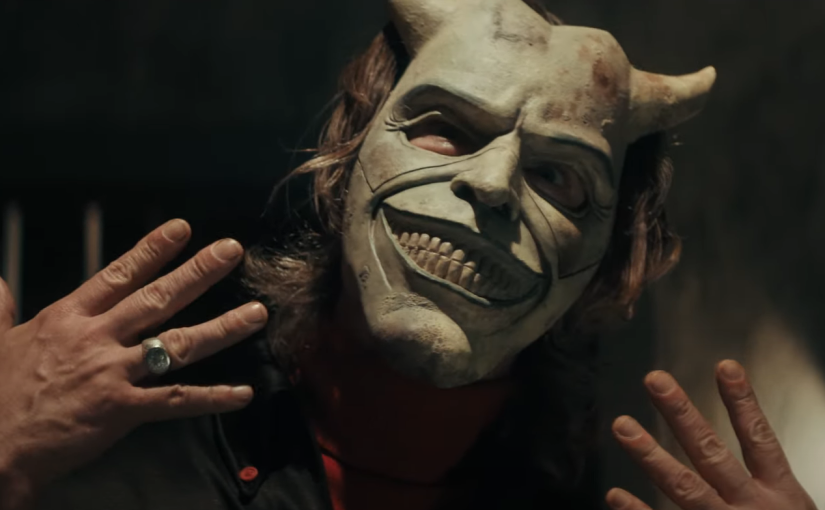[mild spoilers below]
Scott Derrickson’s adaption of Joe Hill’s short story is very competently directed, though the growing pains from expanding the source material are evident.

From the outset we’re delivered a less nostalgic portrait of the 70s, akin to media that follows historical crime cases from the 70s, like Mindhunter, but with more of a kid-centric POV. Sandlot meets Silence of the Lambs. Which is refreshing, and helps the film from beginning to end.
At times the child acting is grating, but the lead (Mason Thames) has his moments, and Madeleine McGraw truly steals the show as Finney’s sister, demonstrating a great range, from effective comedy to uncomfortable tragedy. A real highlight.
Ethan Hawke also NAILS the Grabber. Right on the head. He plays a terrifying monster of an antagonist with all the right ingredients. His scenes are well shot, and spine tingling.
So where does all this promise go?
The meat of the film is the “escape room” scenario. The “Grabber” traps Finney in his basement. Puzzle time. The titular black phone on the wall promises to add a spin on the help-I’m-trapped narrative, but underdelivers. The “Grabber’s” past victims each give Finney a call suggesting a different plan of escape. These various methods make up the bulk of the additions to the source material, and it shows, as Finney half tries each of these odd ideas that all vaguely fail. It’s a formula we expect, and it’s satisfying enough to get by—just a bit disappointing. However, the narrative is able to tie it all together in the end in a way that recovers a good deal of justification, even if it’s a little shoe-horned.
But the real disappointment is the big picture ending. Throughout the story we’re fed bits and pieces, breadcrumbs and hints, of a sinister backstory that includes magic, visions, mystical phones, ghosts, and a “game” that the Grabber’s playing. None of which leads ANYWHERE. Why does Finney’s sister Gwen have dreams that tell the future? Because it’s a convenient plot device. AKA, “just because.” MANY horror/fantasy films do this and seem to get away with it, but it’s grown to be a huge pet peeve of mine. It’s also impossible to divorce the “magic” in the black phone from the shining (the ability from The Shining), or denote why Stephen King (Hill’s father) can get away with it, yet it reeks in The Black Phone. Maybe it’s because the same offense applies to all areas of the half-baked backstory that isn’t resolved. (Worth noting that Hill’s short story does not share these problems.) What is the motive of the Grabber and what’s the deal with his mask? Turns out he just likes to kill kids, and the mask vaguely hints at the “hot and cold” nature of the Grabber. The mask IS scary and cool, but ultimately it feels like the result of a thinktank to design the next cool killer’s mask to join the lineup (i.e. Jason’s hockey mask, Michael Myers’ mask etc.). It’s a gimmick that wants you to think it means more than the story can support.
Additionally, some of these plot offenses are aided by bad exposition. It’s an unforgivable anti-climax. The short story’s ending does it right in a way that can’t quite be adapted effectively, but the filmmakers certainly went the wrong direction, opting for cheese over heft. Furthermore, making the “final blow” that kills the killer unrealistic, and having a kid whisper along the lines of “did you hear Finney did X? Sounds unrealistic…” as Finney walks down the school halls, is not a get-out-of-jail-free card. Just saying.
Despite all of the letdown, The Black Phone is still endearing, almost in a way that begs to be liked. It nicely mixes in some humor and even a few good scares for its solid characters. I can squint at it all I want, but The Black Phone is worth a watch.

